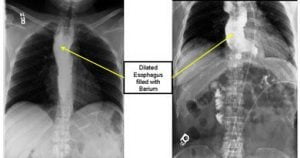Overview:
Achalasia can be defined as the deficiency of the lower esophageal sphincter (a ring of muscle situated between the lower esophagus and the stomach) to relax and the presence of unusual motility in the remainder of the esophagus.

What Are Causes for Achalasia?
The cause of achalasia is unknown. It may occur due to infection, heredity or an abnormality of the immune system that causes the body itself to damage the esophagus (autoimmune disease).
What Are the Signs & Symptoms?
Achalasia does not occur overnight. It can take years to develop, and some people ignore symptoms for years before going to the doctor.
The symptoms of achalasia includes:
- Difficulty swallowing food which includes both solid and liquid food. Patients typically learn to compensate for their dysphagia by:
– Eating slowly
– Taking smaller bites
– Chewing well
- Regurgitation of food that is recollected in the esophagus. If this happens at night, food may be aspirated into the lungs, which can be a serious medical problem
- Chest uneasiness from esophageal dilation and/or retained food
- Sharp chest pain with unclear cause
- Heartburn; the heartburn is not characteristic of heartburn and is not help out by treatment for heartburn
- Loss of weight due to low intake of food
How it is Diagnosed?
Because achalasia symptoms closely resemble heartburn, your doctor may treat it first. If that doesn’t work, he’ll probably start investigating for achalasia.
Upper GI Endoscopy It has a tiny camera attached to a long tube so the doctor can see down your esophagus.
Esophageal manometry for evaluating the pressure changes in the Esophagus and stomach.A doctor passes a thin tube down your throat to assess the strength of your esophageal muscles while taking sips of water. It also measures how well the stomach valve works.
X-ray studies like Barium swallow

How Is It Treated?
The best treatment for you depends on many different things. Your doctor can help you decide what you need.
Treatments for achalasia include:
- Diet. There is no special diet for the condition, but you may discover on your own which foods pass through your esophagus more easily.Drinking more water with meals may help. If your achalasia is severe, a liquid diet may be your best bet for a while.
- Oral Medications Two classes of drugs, nitrates and calcium channel blockers, have LES muscle-relaxing effects. These drugs can decrease symptoms in people with achalasia.
- Stretching of the lower esophageal sphincter (dilation) to ease the passage of food.
- Surgery to cut the sphincter (esophagomyotomy) Surgery is the most successful treatment for Achalasia. With surgery most of the pateients get relief from symptom for long time.

- Dilation and esophagomyotomy
All above treatments reduce the pressure within the lower esophageal sphincter to allow easier passage of food from the esophagus into the stomach.

